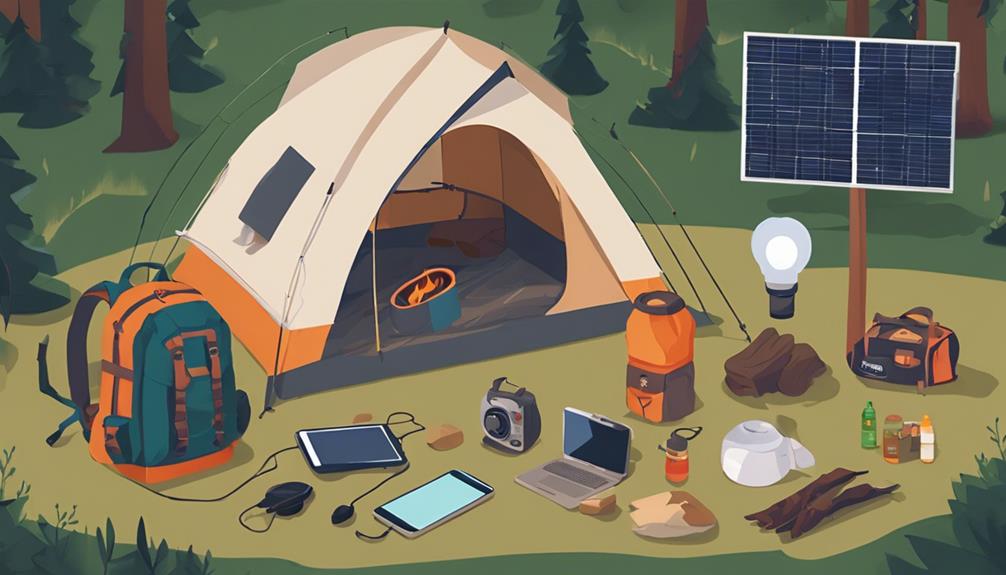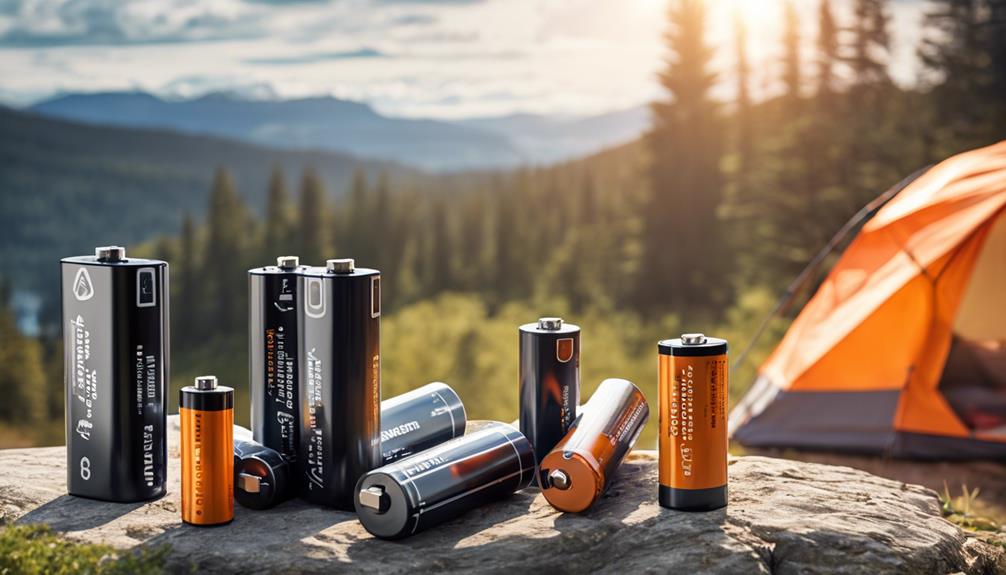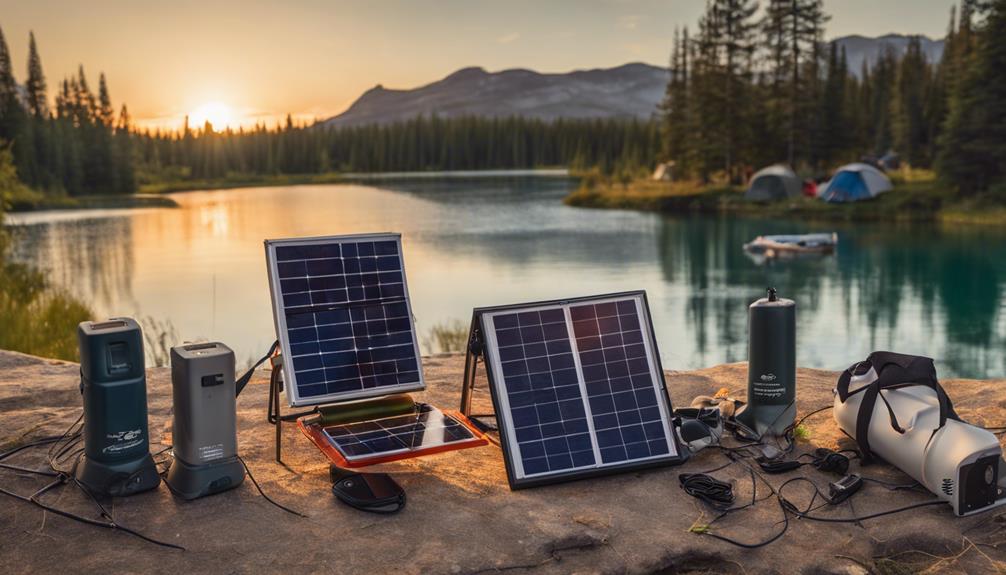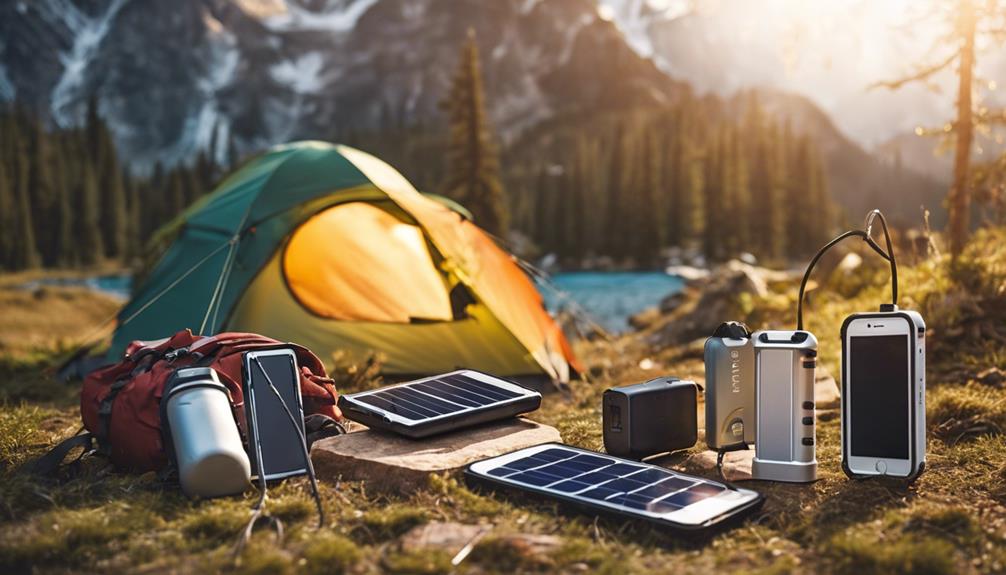When camping, choose solar power systems to secure dependable and eco-conscious energy. Attain independence in generating electricity, allowing exploration of secluded locations with minimal carbon footprint and consistent power for off-grid life. Choose from various solar panels like flexible or rigid types, prioritizing requirements. Consider battery capacity and voltages, choosing lithium-ion for lightweight energy. Set up in sunny locations, adjusting panel angles for peak performance. Routine panel cleaning and maintenance guarantee top efficiency. Take care to examine for wear and weather protection regularly. Additional information on varieties, battery selections, and system improvement are available.
Benefits of Solar Power Systems

Utilizing solar power systems for camping offers campers a reliable and eco-friendly source of energy to power their devices and equipment in remote locations. When you venture into off-grid living, these systems provide you with the independence of generating your electricity.
By harnessing the power of the sun, you can enjoy the freedom of exploring the wilderness without worrying about access to traditional power sources. This not only reduces your carbon footprint but also guarantees that you have a consistent energy supply wherever your adventures take you.
Energy independence is an essential aspect of camping, especially for extended stays in remote areas. With solar power systems, you can charge your electronics, run small appliances, and light your camping area without relying on generators or public electricity grids.
This self-sufficiency allows you to enjoy nature without disrupting it with noisy generators or harming the environment with fossil fuels. Embracing solar power for camping truly empowers you to live off the grid responsibly and sustainably.
Types of Solar Panels
When considering solar power systems for camping, it's important to understand the different types of solar panels available to meet your energy needs effectively.
For portable options, flexible solar panels are lightweight and can be easily folded or rolled up for transportation. These are ideal for campers seeking a convenient solution.
On the other hand, rigid solar panels are more durable and suitable for semi-permanent installations on RVs or camper vans.
Efficiency ratings play a significant role in determining how much power a solar panel can generate. Monocrystalline panels are known for their high efficiency, making them a popular choice for camping applications where space is limited. Polycrystalline panels are slightly less efficient but come at a lower cost.
Durability factors should also be considered, especially for outdoor use. Look for panels with robust construction and weather-resistant materials to withstand rough camping conditions.
When installing solar panels for camping, make sure they're securely mounted and positioned to receive maximum sunlight throughout the day.
Choosing the Right Battery

Consider the capacity and voltage requirements of your solar power system when selecting the appropriate battery for your camping needs. When deciding between Lithium-ion and AGM batteries, keep in mind that Lithium-ion batteries are lighter, have a higher energy density, and longer lifespan compared to AGM batteries, making them a popular choice for portable solar power systems.
On the other hand, AGM batteries are more cost-effective and require less maintenance but are heavier and bulkier.
For portable solar power systems, Lithium-ion batteries are often preferred due to their lightweight and compact design, making them easy to transport. Conversely, fixed solar power systems may benefit from the lower cost and simplicity of AGM batteries, especially when weight and size aren't primary concerns.
Ultimately, the choice between Lithium-ion and AGM batteries will depend on your specific camping setup and requirements. Select a battery that aligns with the capacity and voltage needs of your solar power system to maximize efficiency and performance during your outdoor adventures.
Setting Up Your System
Wondering how to efficiently set up your solar power system for camping? When setting up your system, consider portable options that are both budget-friendly and offer sufficient power output. To begin, choose a location for your solar panels that receives direct sunlight for the majority of the day. Position the panels towards the sun to optimize energy absorption.
For installation tips, securely mount the panels using adjustable mounts for easy positioning. Connect the panels to a charge controller to regulate the power flow to your battery effectively. Utilize suitable cables and connectors to prevent power loss and maintain a steady flow of energy.
When setting up your battery, verify it's compatible with your solar panels and has enough capacity to store the generated power. Keep the battery in a ventilated area to avoid overheating.
Maximizing Solar Efficiency

To maximize solar efficiency for your camping setup, strategically adjust the angle of your solar panels throughout the day to capture the most sunlight possible. The best angle varies depending on your location and the time of day.
In the morning, position the panels facing east to catch the early sunlight. As the day progresses, track the sun's movement and adjust the panels to face south, ensuring maximum exposure. In the evening, shift them towards the west. This constant adjustment can notably increase the amount of energy collected.
Additionally, keeping your solar panels clean is essential for efficiency. Dust, dirt, or debris can obstruct sunlight absorption. Regularly clean the panels with a mild detergent and a soft cloth to maintain peak performance.
When camping, portable chargers and power banks are valuable accessories to store excess energy generated during the day. These devices allow you to charge your electronics on-the-go, providing a convenient power solution during your outdoor adventures.
Remember to utilize angle adjustment and clean panels to make the most of your solar power system.
Maintenance and Care Tips
Regular maintenance of your solar power system is important to guarantee peak performance during your camping adventures. Start by cleaning the panels regularly to maximize sunlight absorption. Use a mild soap, water, and a soft cloth to wipe away any dirt or debris.
Inspect the panels for any signs of damage like cracks or scratches that could impact their efficiency. Weather protection is essential for the longevity of your system. Make sure all cables are properly insulated and shielded from extreme weather conditions.
Check for any exposed wires or corrosion that could result in disruptions in power generation. Additionally, secure your system during inclement weather to prevent damage from strong winds or heavy rain.
Regularly inspect the connections between the panels, charge controller, and battery to ensure everything is secure and functioning correctly. Keep an eye out for loose connections or signs of wear that may need tightening or replacement.
Frequently Asked Questions
Can Solar Power Systems Work in Cloudy Weather?
In cloudy weather, solar efficiency may decrease due to reduced sunlight. However, with sufficient battery storage, you can still harness solar power even in overcast conditions. It's crucial to take into account the impact of weather on energy production.
Are Portable Solar Panels Waterproof?
Yes, portable solar panels are waterproof to guarantee durability and longevity. Waterproofing concerns are addressed during manufacturing, providing protection against moisture and guaranteeing functionality in various weather conditions, making them suitable for outdoor activities like camping.
How Do I Secure My Solar Panels While Camping?
To secure your solar panels while camping, consider panel protection like covers or cases to prevent damage. Use anchoring solutions such as stakes, clamps, or brackets to secure panels to the ground, roof racks, or other stable surfaces.
Can I Use a Solar Power System in Cold Climates?
In cold climates, solar power systems can still perform well in winter. Snow coverage may hinder efficiency, but panels are designed to withstand low temperatures. Regularly clearing snow and angling panels can optimize performance.
What Is the Lifespan of a Solar Power Battery?
Battery lifespan is affected by various factors like maintenance and climate. To extend it, provide adequate care and peak efficiency. Costs for replacement options vary, so research before deciding. Regular maintenance can prolong battery life.
Conclusion
To sum up, solar power systems for camping offer numerous benefits such as:
- Renewable energy
- Cost savings
- Eco-friendliness
By choosing the appropriate type of solar panels and battery, setting up the system correctly, and maximizing efficiency, you can guarantee a reliable power source for all your camping needs.
Remember to regularly maintain and care for your solar power system to prolong its lifespan and keep it functioning at its best.
Enjoy the convenience and sustainability of solar power on your next camping trip!
